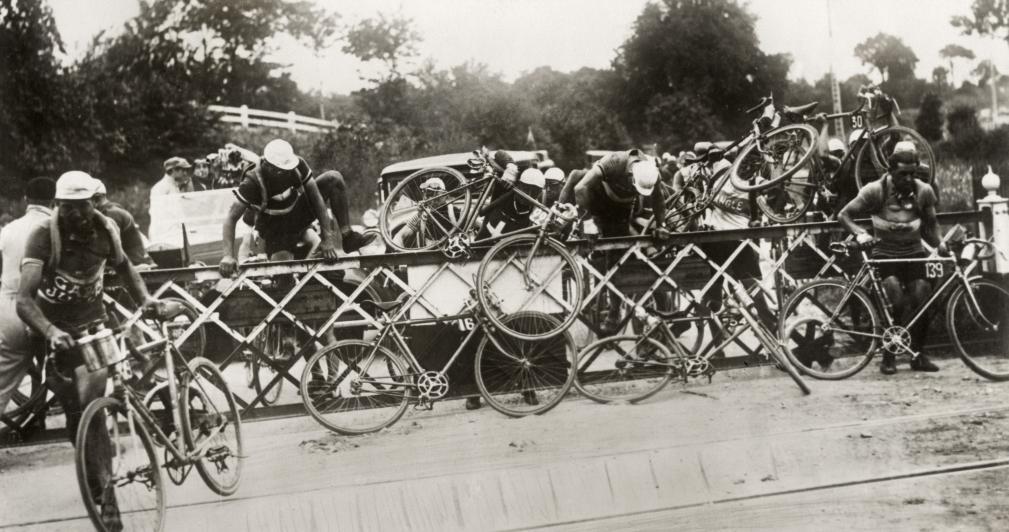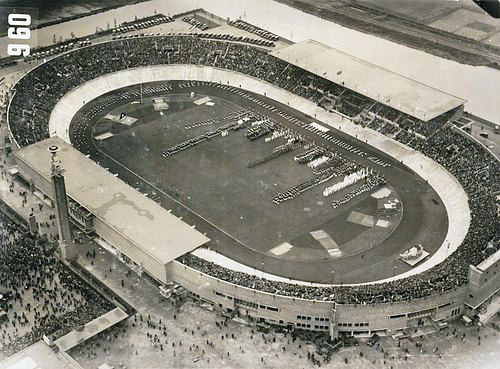|
Gottlieb Wanzenried
Gottlieb Wanzenried (2 September 1906 – 24 June 1993) was a Swiss cyclist. He competed in the individual and team road race events at the 1928 Summer Olympics The 1928 Summer Olympics (), officially the Games of the IX Olympiad (), was an international multi-sport event that was celebrated from 28 July to 12 August 1928 in Amsterdam, Netherlands. The city of Amsterdam had previously bid for .... References External links * 1906 births 1993 deaths Swiss male cyclists Olympic cyclists for Switzerland Cyclists at the 1928 Summer Olympics Cyclists from Bern 20th-century Swiss sportsmen {{Switzerland-cycling-bio-stub ... [...More Info...] [...Related Items...] OR: [Wikipedia] [Google] [Baidu] |
1932 Tour De France
The 1932 Tour de France was the 26th edition of the Tour de France, taking place from 6 to 31 July. It consisted of 21 stages over . André Leducq, who also won six stages, won the race, thanks to the bonification system; had the bonification system not existed, the margin between Leducq and Kurt Stöpel would only have been three seconds. Innovations and changes In the 1931 Tour de France, there had been a time bonification system, which gave 3 minutes of bonification to the winner of the stage, if he finished more than three minutes ahead of the second cyclist in that stage. In 1932, this bonification system changed: now the winner of the stage received 4 minutes, the second-placed cyclist 2 minutes and the third-placed cyclist 1 minute, plus an extra three minutes if the margin was more than three minutes. The bonification system was invented to give sprinters, who lost a lot of time in the mountains, a chance to battle for the general classification. The number of stages dec ... [...More Info...] [...Related Items...] OR: [Wikipedia] [Google] [Baidu] |
Cycle Sport
Cycle sport is Competition, competitive physical activity using bicycles. There are several categories of bicycle racing including road bicycle racing, cyclo-cross, mountain bike racing, track cycling, BMX, and cycle speedway. Non-racing cycling sports include artistic cycling, cycle polo, freestyle BMX, mountain bike trials, Hardcourt Bike Polo, hardcourt bike polo and cycleball. The (UCI) is the world Sport governing body, governing body for cycling and international competitive cycling events. The International Human Powered Vehicle Association is the governing body for human-powered vehicles that imposes far fewer restrictions on their design than does the UCI. The UltraMarathon Cycling Association is the governing body for many ultra-distance cycling races. Bicycle racing is recognised as an Olympic sport. Bicycle races are popular all over the world, especially in Europe. The countries most devoted to bicycle racing include Belgium, Denmark, France, Germany, Italy, the N ... [...More Info...] [...Related Items...] OR: [Wikipedia] [Google] [Baidu] |
Cycling At The 1928 Summer Olympics – Men's Individual Road Race
Cycling, also known as bicycling or biking, is the activity of riding a bicycle or other types of pedal-driven human-powered vehicles such as balance bikes, unicycles, tricycles, and quadricycles. Cycling is practised around the world for purposes including transport, recreation, exercise, and competitive sport. History Cycling became popularized in Europe and North America in the latter part and especially the last decade of the 19th century. Today, over 50 percent of the human population knows how to ride a bike. War The bicycle has been used as a method of reconnaissance as well as transporting soldiers and supplies to combat zones. In this it has taken over many of the functions of horses in warfare. In the Second Boer War, both sides used bicycles for scouting. In World War I, France, Germany, Australia and New Zealand used bicycles to move troops. In its 1937 invasion of China, Japan employed some 50,000 bicycle troops, and similar forces were instrumental in J ... [...More Info...] [...Related Items...] OR: [Wikipedia] [Google] [Baidu] |
Cycling At The 1928 Summer Olympics – Men's Team Road Race
Cycling, also known as bicycling or biking, is the activity of riding a bicycle or other types of pedal-driven human-powered vehicles such as balance bikes, unicycles, tricycles, and quadricycles. Cycling is practised around the world for purposes including transport, recreation, exercise, and competitive sport. History Cycling became popularized in Europe and North America in the latter part and especially the last decade of the 19th century. Today, over 50 percent of the human population knows how to ride a bike. War The bicycle has been used as a method of reconnaissance as well as transporting soldiers and supplies to combat zones. In this it has taken over many of the functions of horses in warfare. In the Second Boer War, both sides used bicycles for scouting. In World War I, France, Germany, Australia and New Zealand used bicycles to move troops. In its 1937 invasion of China, Japan employed some 50,000 bicycle troops, and similar forces were instrumental in Japa ... [...More Info...] [...Related Items...] OR: [Wikipedia] [Google] [Baidu] |
1928 Summer Olympics
The 1928 Summer Olympics (), officially the Games of the IX Olympiad (), was an international multi-sport event that was celebrated from 28 July to 12 August 1928 in Amsterdam, Netherlands. The city of Amsterdam had previously bid for the 1920 and 1924 Olympic Games. Still, it was obliged to give way to war-torn Antwerp in Belgium for the 1920 Summer Olympics, 1920 Games and Pierre de Coubertin's Paris for the 1924 Summer Olympics, 1924 Games. The only other candidate city for the 1928 Olympics was Los Angeles, which would eventually be selected to host the Olympics four years later. In preparation for the 1932 Summer Olympics, the United States Olympic Committee reviewed the costs and revenue of the 1928 Games. The committee reported a total cost of United States dollar, US$1.183 million with receipts of US$1.165 million, giving a negligible loss of US$18,000, which was a considerable improvement over the 1924 Games. The United States won the most gold and medals over ... [...More Info...] [...Related Items...] OR: [Wikipedia] [Google] [Baidu] |
1906 Births
Events January–February * January 12 – Persian Constitutional Revolution: A nationalistic coalition of merchants, religious leaders and intellectuals in Persia forces the shah Mozaffar ad-Din Shah Qajar to grant a constitution, and establish a national assembly, the National Consultative Assembly, Majlis. * January 16–April 7 – The Algeciras Conference convenes, to resolve the First Moroccan Crisis between French Third Republic, France and German Empire, Germany. * January 22 – The strikes a reef off Vancouver Island, Canada, killing over 100 (officially 136) in the ensuing disaster. * January 31 – The 1906 Ecuador–Colombia earthquake, Ecuador–Colombia earthquake (8.8 on the Moment magnitude scale), and associated tsunami, cause at least 500 deaths. * February 7 – is launched, sparking a Anglo-German naval arms race, naval race between Britain and Germany. * February 11 ** Pope Pius X publishes the encyclical ''Vehementer Nos'', de ... [...More Info...] [...Related Items...] OR: [Wikipedia] [Google] [Baidu] |
1993 Deaths
This is a list of lists of deaths of notable people, organized by year. New deaths articles are added to their respective month (e.g., Deaths in ) and then linked below. 2025 2024 2023 2022 2021 2020 2019 2018 2017 2016 2015 2014 2013 2012 2011 2010 2009 2008 2007 2006 2005 2004 2003 2002 2001 2000 1999 1998 1997 1996 1995 1994 1993 1992 1991 1990 1989 1988 1987 1986 Earlier years ''Deaths in years earlier than this can usually be found in the main articles of the years.'' See also * Lists of deaths by day * Deaths by year (category) {{DEFAULTSORT:deaths by year ... [...More Info...] [...Related Items...] OR: [Wikipedia] [Google] [Baidu] |
Swiss Male Cyclists
Swiss most commonly refers to: * the adjectival form of Switzerland *Swiss people Swiss may also refer to: Places * Swiss, Missouri * Swiss, North Carolina * Swiss, West Virginia * Swiss, Wisconsin Other uses * Swiss Café, an old café located in Baghdad, Iraq *Swiss-system tournament, in various games and sports * Swiss International Air Lines **Swiss Global Air Lines, a subsidiary *Swissair, former national air line of Switzerland * .swiss alternative TLD for Switzerland See also *Swiss made, label for Swiss products *Swiss cheese (other) *Switzerland (other) *Languages of Switzerland, none of which are called "Swiss" *International Typographic Style, also known as Swiss Style, in graphic design *Schweizer (other), meaning Swiss in German *Schweitzer Schweitzer is a surname. Notable people with the surname include: * Albert Schweitzer (1875–1965), German theologian, musician, physician, and medical missionary, winner of the 1952 Nobel Peace Priz ... [...More Info...] [...Related Items...] OR: [Wikipedia] [Google] [Baidu] |
Olympic Cyclists For Switzerland
Olympic or Olympics may refer to Sports Competitions * Olympic Games, international multi-sport event held since 1896 ** Summer Olympic Games ** Winter Olympic Games * Ancient Olympic Games, ancient multi-sport event held in Olympia, Greece between 776 BC and 393 AD * Olympic (greyhounds), a competition held annually at Brighton & Hove Greyhound Stadium Clubs and teams * Adelaide Olympic FC, a soccer club from Adelaide, South Australia * Fribourg Olympic, a professional basketball club based in Fribourg, Switzerland * Sydney Olympic FC, an Australian soccer club * Olympic Club (Barbacena), a Brazilian football club based in Barbacena, Minas Gerais state * Olympic Mvolyé, a Cameroonian football club based in Mvolyé * Olympic Club (Egypt), a football and sports club based in Alexandria * Blackburn Olympic F.C., an English football club based in Blackburn, Lancashire * Rushall Olympic F.C., an English football club based in Rushall * FC Olympic Tallinn, an Estonia ... [...More Info...] [...Related Items...] OR: [Wikipedia] [Google] [Baidu] |
Cyclists At The 1928 Summer Olympics
Cycling, also known as bicycling or biking, is the activity of riding a bicycle or other types of pedal-driven human-powered vehicles such as balance bikes, unicycles, tricycles, and quadricycles. Cycling is practised around the world for purposes including transport, recreation, exercise, and competitive sport. History Cycling became popularized in Europe and North America in the latter part and especially the last decade of the 19th century. Today, over 50 percent of the human population knows how to ride a bike. War The bicycle has been used as a method of reconnaissance as well as transporting soldiers and supplies to combat zones. In this it has taken over many of the functions of horses in warfare. In the Second Boer War, both sides used bicycles for scouting. In World War I, France, Germany, Australia and New Zealand used bicycles to move troops. In its 1937 invasion of China, Japan employed some 50,000 bicycle troops, and similar forces were instrumental in Japan' ... [...More Info...] [...Related Items...] OR: [Wikipedia] [Google] [Baidu] |






